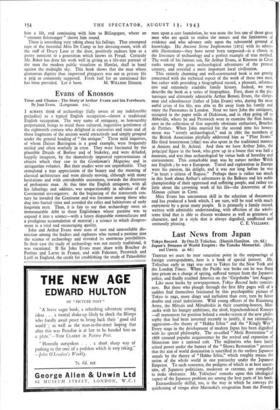Time and Chance : The Story of Arthur Evans and
his Forebears. By Joan Evans. (Longmans. 2Is.)
Evans of Knossos
I ALWAYS think of archaeology (fully aware of my indefensible prejudice) as a typical English occupation—almost a traditional English occupation. The very name of antiquary, so honourably perpetuated, brings to mind those cultured, inquisitive gentlemen of the eighteenth century who delighted in curiosities and ruins and all those fragments of the ancient world attractively and simply grouped under the general heading of " the antique." These mild inquirers, of whom Daines Barrington is a good example, were frequently misled and often woefully in error. They were fascinated by the plausible Druids of Borlase and of Stukeley, and were deluded, happily insapient, by the shamelessly improved representations of objects which they saw in the Gentleman's Magazine and in antiquarian volumes. But their studies were not unprofitable. They stimulated a true appreciation of the beauty and the . meaning of classical architecture and were already moving, although with many hesitations and with considerable uneasiness, towards the discovery of prehistoric man. At this time the English antiquary, with all his falterings and oddities, was unquestionably in advance of the Continental investigators. At the beginning of the nineteenth cen- tury he invaded the Continent and was foremost among those who dug into buried cities and revealed the relics and habitations of early forgotten men. Thus, it is fair to say that archaeology owes an immeasurable debt to those Fnglishmen whose pastime was to expand it into a science—with a heavy disputable nomenclature and a prodigious accumulation of material ; a science in which disagree- ment is a vital and encouraging quality. John and Arthur Evans were men of rare and unassailable dis- tinction among the leaders and explorers who turned a pastime into the science of archaeology and revealed its enormous possibilities. In their case the study of archaeology was not merely traditional, it was vocational. If Sir John Evans must share with Boucher de Perthes and Lartet in France, and with Falconer, Prestwich .and Lyell in England, the credit for establishing the study of Palaeolithic man upon a sure foundation, he was none the less one of those great men who are quick to realise the nature and the limitations of evidence and who advance only upon the substantial ground of knowledge. His Ancient Stone Implements (1872) with its admir- able illustrations—they have never been surpassed—is a classic in the literature of archaeology and a perfect example of true method. The work of his famous son, Sir Arthur Evans, at Knossos in Crete ranks among the great archaeological adventures of the present century, and revealed a most important local civilisation.
This entirely charming and well-constructed book is not greatly concerned with the technical aspect of the work of these two men, but rather with providing a biographical record, a pleasant, informa- tive and extremely readable family history. Indeed, we may describe the book as a series of biographies. First, there is the pic- turesque and ultimately admirable Arthur Benoni Evans, the clergy- man and schoolmaster (father of John Evans) who, during the most awful crisis of his life, was able to flit away from his family and enjoy the Panoramas in London. Next we have John the antiquary, occupied in the paper mills of Dickinson, and in 1859 going off to Abbeville, where he and Prestwich were to examine the flint hand; axes in the collection of that superbly obstinate enthusiast, Boucher de Perthes. When John married for the second time his honey- moon was " sternly archaeological," and in 1861 the members of the British Association playfully addressed him as " Flint Evans." His third honeymoon (1892) was also spent in the traditional manner at Amiens and St. Acheul. And then we have Arthur John, the prirIcipal figure in the book, who grew up in a house that was half a museum, and was thus archaeological by virtue both of heredity and environment. This remarkable man was by nature neither Welsh nor English ; he was a European. Travel and exploration in Europe were his passion, his delight, and it was not long before he was " in -heart a citizen of Ragusa." Perhaps there is rather too much in this book about Arthur's adventures in the Balkans and his noble championship of their oppressed and suffering people, and rather too little about the crowning work of his life—the discoveries of the Minoan culture in Crete.
Miss Evans has uncommon skill in the selection of documents and has produced a book which, I am sure, will be read with much enjoyment by a great many people. It is primarily a family record, written with admirable understanding, with affection of the whole- some kind that is able to discern weakness as well as greatness of character, and in a style that is always dignified, unaffected and






















 Previous page
Previous page